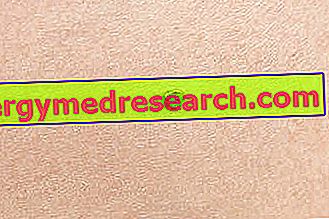Pollen allergy and corticosteroid anti-inflammatory drugs
Corticosteroid anti-inflammatories ( cortisone ) have a dual action. On the one hand, these drugs inhibit the production of inflammation mediators, and on the other they increase the activity of the cells of the immune system:

Corticosteroid anti-inflammatory drugs :
- They are used to treat the most serious symptoms caused by the allergic reaction to pollen; help prevent and treat inflammation caused by rhinitis and / or allergic conjunctivitis.
- They can be administered systemically (in the most severe acute forms) or topically on medical prescription: they are available as sprays, eye drops, ophthalmic ointments, tablets.
- They should be used for short periods and only on medical prescription because they involve many side effects, such as hyperglycemia, weight gain, alteration of odors or flavors, hypertension, ulcer, acne, insomnia, mood swings.
- The spray formulations, to be administered directly into the nose, contain very low doses of active ingredients, therefore entailing minor undesirable effects.
Pollen allergy and specific immunotherapy
In the event that the "classic" pharmacological options do not alleviate the symptoms of pollen allergy, the doctor may recommend specific treatments for allergy (immunotherapy or desensitization therapy). In this context, specific immunotherapy plays an important role, as it is able to modify the natural history of the disease. Specific immunotherapy, that is the administration of a " vaccine", which progressively desensitises the organism against specific allergens, induces with time a tolerance towards antigenic pollen.
The vaccine, however, is not always a possible and recommended solution : the allergist specialist must determine if and when it can be useful, in relation to the symptoms present, the type of allergy and the characteristics of the allergic patient.
The treatment, which must be carried out on medical observation for a period ranging from three to five years, consists in the subcutaneous or sublingual administration of purified allergen extracts, in minimal and increasing doses. The goal is to desensitize the patient with respect to the specific pollen allergen, reducing clinical signs and limiting the need to resort to drugs. In order for the vaccine to take effect, it is necessary to scrupulously follow the specialist's instructions and never skip a dose.
Specific immunotherapy is contraindicated in the presence of acute infectious diseases or if you are following therapies based on beta-blockers. The use of the vaccine is not recommended for children under the age of three and for pregnant women.
The classic routes of administration are subcutaneous (by injection) and sublingual :
Injection vaccine: it was the first type of vaccine developed. It includes two types of treatments:
- The short-term treatment, also called "pre-seasonal treatment", consists of 12-14 subcutaneous injections which must be repeated every year for about 3-5 years, at regular intervals, a few months before the critical season.
- Long-term treatment, also called "continuous", involves the initial administration of an allergen extract in minimal doses. It then continues, injecting increasing doses under the skin once a month for some years, until a decisive improvement is noted.
The sublingual vaccine: in this case, the allergens are contained in drops, single-dose vials or tablets, and should be taken orally: in part they are ingested, partly absorbed by the mucous membrane of the mouth.
- We start a phase that can last from a few days to a month depending on the drug, in which the amount of allergen is gradually increased until it reaches a maximum dosage, which corresponds to the maintenance dose.
- Pre-seasonal administration is usually used for seasonal pollen allergens. The treatment is started one to two months before the start of the pollen season towards which the subject is sensitized, then continued throughout the pollination period.
Pollen and bronchodilator allergy
The bronchodilator drugs, available on prescription, are in the form of sprays and can be used as needed. These drugs have the ability to "spread the bronchi": the active principle contained in them, in fact, relaxes the smooth muscles that surround the bronchial airways, dilating them.
Bronchodilator drugs should be used with extreme caution: daily use greater than three sprays can trigger side effects, including tachycardia, headaches and tremors. The most used are: beta-2-stimulants, anticholinergics, theophylline etc.
Final considerations
To facilitate the specialist in establishing the most effective treatment regimen against pollen allergy, it is useful that the person establishes a collaborative relationship and adheres consistently and patiently to medical indications. The therapeutic strategy must be evaluated individually and must always be discussed and agreed with the doctor, not only for the choice of the most suitable drugs, but for the search for therapeutic balance capable of leading to healing or to accompany the entire life of the allergic person in the case of chronic symptoms.



